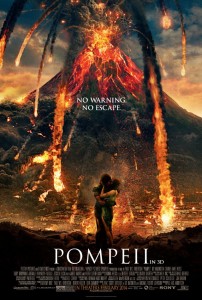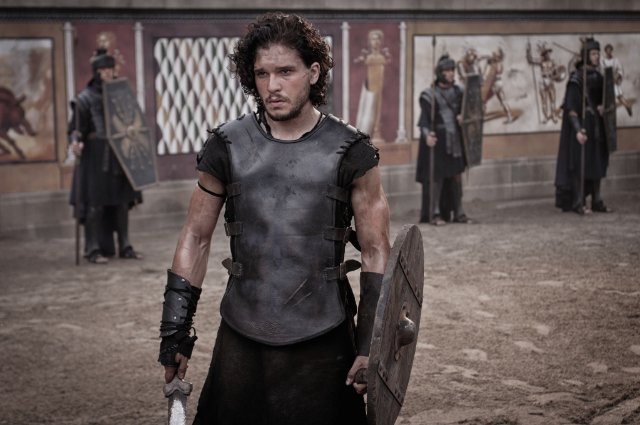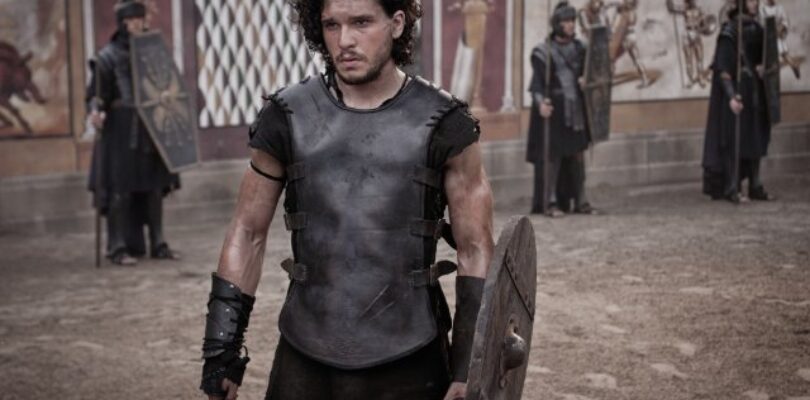
| Release Date: | February 21st, 2014 |
| Starring: | Kit Harington, Emily Browning, Kiefer Sutherland, Jared Harris, Jessica Lucas, Adewale Akinnuoye-Agbaje, Carrie-Anne Moss, Joe Pingue, Dalmar Abuzeid, Sasha Roiz |
| User Rating: | |
| Writer: | Janet Scott Batchler, Lee Batchler, Michael Robert Johnson |
| MPAA Rating: | PG-13 |
| Director: | Paul W. S. Anderson |
There are certain events from history that inherently lend themselves to being depicted on the movie screen. One such event is the destruction of the ancient Roman city of Pompeii following the eruption of the volcano Mount Vesuvius in 79 AD. Pompeii has already been used as the setting of no less than nine films, many of them based on or inspired by Edward Bulwer-Lytton’s 1834 novel The Last Days of Pompeii. Now, the famous disaster is being brought to the screen again in a new film by director/writer/producer Paul W. S. Anderson, simply titled Pompeii. While Pompeii manages to be kind of fun, it remains pretty dumb, definitely cheesy, and not something you should rush out to see.

There are definitely talented people in the cast, but the characters are all pretty underwritten. Kit Harington, best known as Jon Snow on Game of Thrones, does what he can in the lead role of Milo, but the material doesn’t serve him well, and the character is just not engaging. Similarly, Emily Browning is certainly a talented actress, but Cassia just ends up being a damsel in distress, and she frequently has this deer-in-the-headlights look which I found distracting. Kiefer Sutherland gleefully hams it up as the evil Senator Corvus, chewing the scenery and being a complete prick to everyone around him. However, something about Sutherland’s voice just didn’t fit with this setting. Maybe he’s been doing American accents for roles for so long that he wasn’t able to shake it, but in a movie where everyone else is doing some variety of British accent, he sounds out of place. Much to my pleasant surprise, the true standout of the cast is Adewale Akinnuoye-Agbaje as the champion gladiator Atticus. His subplot of being one match away from finally winning his freedom works better than any other part of the human drama, and the movie as a whole would have been better if he had been the focus. I found it funny that Jessica Lucas, who plays Cassia’s handmaiden Ariadne, essentially has the same role of “female lead’s close friend” that she did in Cloverfield (2008). Jared Harris and Carrie-Anne Moss do what they can as Cassia’s parents Severus and Aurelia, but they are given almost nothing to do.
I’ve had an interesting relationship with the work of filmmaker Paul W. S. Anderson. On the one hand, he directed Mortal Kombat (1995), which I still consider the only good movie based on a video game that we’ve had so far. But on the other hand, he also kicked off the Resident Evil film series, which I’ve thankfully been able to move past my early hatred of and now just regard with indifference. Ultimately, I think he’s an interesting director, if not an especially talented one, and I do try to follow the projects he’s working on. And he is married to Milla Jovovich, so clearly he’s doing something right.
Even if Anderson isn’t a great director, I think his films have featured great production design and good action, and that’s definitely the case in Pompeii. I don’t know how accurate it is to the historical 1st- century Rome, but the costumes and sets look gorgeous. The various fights are all choreographed and shot well, and I was never confused about what was happening or who was who. But the constraints of the film’s PG-13 rating are quite obvious in some moments, such as the notable lack of blood and gore during the arena fights. This isn’t helped by the fact that a character at one point describes the games as “a bloody spectacle,” which definitely does not jive with what we see onscreen. The fights are cool for the most part, especially some of stuff Atticus does with his axe, but I can’t help but imagine they’d be even better in an R-rated film which could have sprays of blood and limbs being removed from bodies. Unfortunately, the computer-generated aspect of the visuals are more uneven. Some of the CGI shots look almost photo-real, and some of them look like detailed video game cutscenes. And without going into spoilers, the extended eruption sequence in the last act of the film does have a handful of moments where members of the main cast emerge relatively unscathed from things which should have badly injured or killed them.

Kit Harington in “Pompeii.” Photo by George Kraychyk – © 2014 Constantin Film International GmbH and Impact Pictures (Pompeii) Inc.
Unfortunately, the film’s writing and story don’t fare as well. Pompeii is pretty shameless about ripping off story beats and other elements from more famous movies, with Conan the Barbarian (1982), Titanic (1997), and Gladiator (2000) being the most obvious sources of “inspiration.” I am not exaggerating when I say that the opening scene of this film, where the Celtic village is attacked by Romans and young Milo loses his parents and is forced into slavery, is taken almost beat-for-beat from the original Conan. The main storyline is lifted almost wholesale from Titanic: the lower-class guy and upper-class girl who fall in love but can’t be together, with the upper-class rival suitor serving as the human villain, all set against the backdrop of a famous historical disaster. Taken from Gladiator is the element of a man who lost his family being wrongly forced into slavery, who then becomes a gladiator, rises up the ranks through his great fighting prowess, and finally gets a chance for revenge against the man responsible for the loss of his family. Of course, you’d be hard-pressed to find any movie nowadays that doesn’t borrow something from a previous film, and doing so doesn’t automatically mean a film is bad. But while the story told in Pompeii is entertaining enough to pass it’s running time without dragging, I do wish the writers had done more to distinguish their screenplay from what’s come before.
Ultimately, Pompeii isn’t a terrible movie, but it also does nothing that really makes it stand out. Despite a good performance from Adewale Akinnuoye-Agbaje, good production design, and some solid action, the underwritten characters, uneven visual effects, and an overly derivative storyline drag the whole thing down. I love period action films, and it’s always slightly disappointing when a new one doesn’t turn out well. In the end, if you are interested in seeing Pompeii, I would recommend that you save your money and wait until it’s available to watch on your preferred rental service.[box_info]WHERE TO WATCH (powered by JustWatch)
[/box_info]


Jeff Grotke
the movie not only steals the plotline from Gladiator, but the same actor who befriended Russell Crowe in Gladiator is a Gladiator’s wing man again, here…
stephanie croc
yes, I thought here’s another “Gladiator” … slave/gladiator with a score to settle, befriended by a noble black gladiator who he’ll “see again” in the afterlife, but it also follows all plot points ever written for this genre. The damsel, the oh-so-bad villain, yada-yada. The first half had me, since I’m a sucker for this kind of action, but the 2nd just got silly – the buildings falling all in a neat row just after the chariot passes them. Worst of all the villain doesn’t suffer true humiliation.
Why not cut off his ….. and make him choke on them?